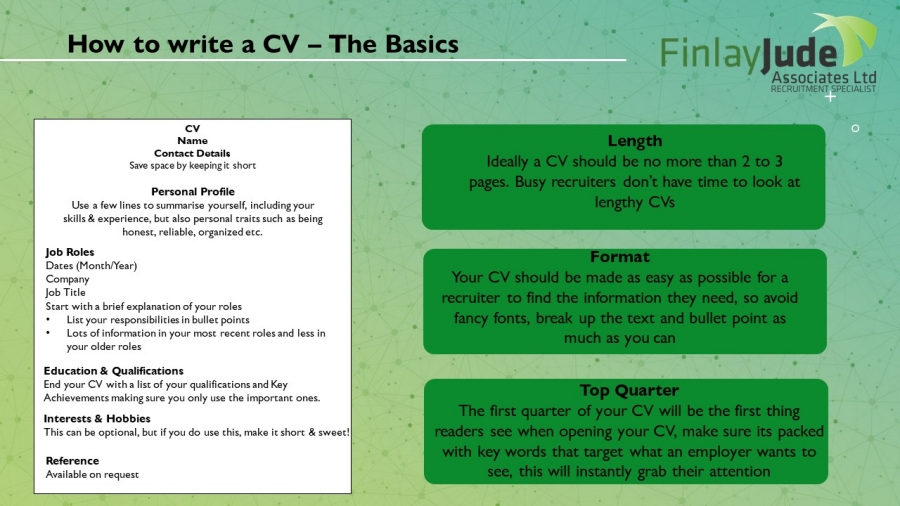How to write an effective CV?

With today’s job market being so competitive, it is more important than ever to have a really well written CV. Your CV serves as your first impression, your gateway to a potential employer!
A CV is representation of your professional journey, which highlights your skills, experience, and accomplishments. A well-written CV can open doors to new opportunities, while a poorly written one can leave you overlooked.
Understanding the Purpose of a CV
The main purpose of a CV is to showcase your qualifications, your suitability for a specific job and to sell yourself to potential employees.
To produce a well written CV you should:
Essential Elements of a CV
A well-structured CV should include the following sections:
Formatting and Presentation
A visually appealing and easy-to-read CV is crucial. Use a clear and consistent font. Ensure proper formatting, such as headings and bullet pointing. Proofread carefully to eliminate any grammatical or spelling errors.
Tailoring Your CV for Each Job
A generic CV is unlikely to capture the attention of potential employers. Take the time to tailor your CV to each job application, highlighting the specific skills and experience that match the job requirements. This shows a potential employer that you have taken the time to understand the position, and this therefore shows you are genuinely interested in the opportunity.
Seeking Feedback and Assistance
Don't hesitate to ask for feedback from family & friends, colleagues, or career counsellors. Get their honest opinion on the overall effectiveness of your CV. Consider using online CV templates or seeking professional assistance to refine your document.
Remember, your CV is a dynamic document that should change as your career progresses. Update it regularly with your latest skills, achievements, and career progression. With careful attention and dedication, your CV can serve as a powerful tool in your job search, opening doors to rewarding career opportunities.
A CV is representation of your professional journey, which highlights your skills, experience, and accomplishments. A well-written CV can open doors to new opportunities, while a poorly written one can leave you overlooked.
Understanding the Purpose of a CV
The main purpose of a CV is to showcase your qualifications, your suitability for a specific job and to sell yourself to potential employees.
To produce a well written CV you should:
- Demonstrate your value - Highlight your skills, experience, and accomplishments that align with the job requirements.
- Use a Clear & Concise Format – your CV should be easy to read and navigate.
- Use a clear Font and keep your sentences short & to the point. A CV should typically be two to three pages.
- Tailor your CV to each job - Avoid a generic CV, it is unlikely to be effective. Read the job description of the role you are applying for and tailor your CV to match the specific requirements of the position you're applying for.
Essential Elements of a CV
A well-structured CV should include the following sections:
- Contact Information:Provide your complete name, email address, phone number.
- Summary or Objective:Briefly introduce yourself and your professional background, highlight your key skills and any career goals using essential key words that target what an employer will want to see.
- Work Experience:List your relevant work experience in reverse order, always start with your most recent position. Describe your responsibilities, achievements, and contributions to the business, always using bullet points to do this.
- Skills: Highlight any skills that are relevant to the job requirements.
- Education & Qualifications: End your CV with a list of your qualifications and any key achievements that may be relevant to the job you are applying for.
Formatting and Presentation
A visually appealing and easy-to-read CV is crucial. Use a clear and consistent font. Ensure proper formatting, such as headings and bullet pointing. Proofread carefully to eliminate any grammatical or spelling errors.
Tailoring Your CV for Each Job
A generic CV is unlikely to capture the attention of potential employers. Take the time to tailor your CV to each job application, highlighting the specific skills and experience that match the job requirements. This shows a potential employer that you have taken the time to understand the position, and this therefore shows you are genuinely interested in the opportunity.
Seeking Feedback and Assistance
Don't hesitate to ask for feedback from family & friends, colleagues, or career counsellors. Get their honest opinion on the overall effectiveness of your CV. Consider using online CV templates or seeking professional assistance to refine your document.
Remember, your CV is a dynamic document that should change as your career progresses. Update it regularly with your latest skills, achievements, and career progression. With careful attention and dedication, your CV can serve as a powerful tool in your job search, opening doors to rewarding career opportunities.


Follow Us